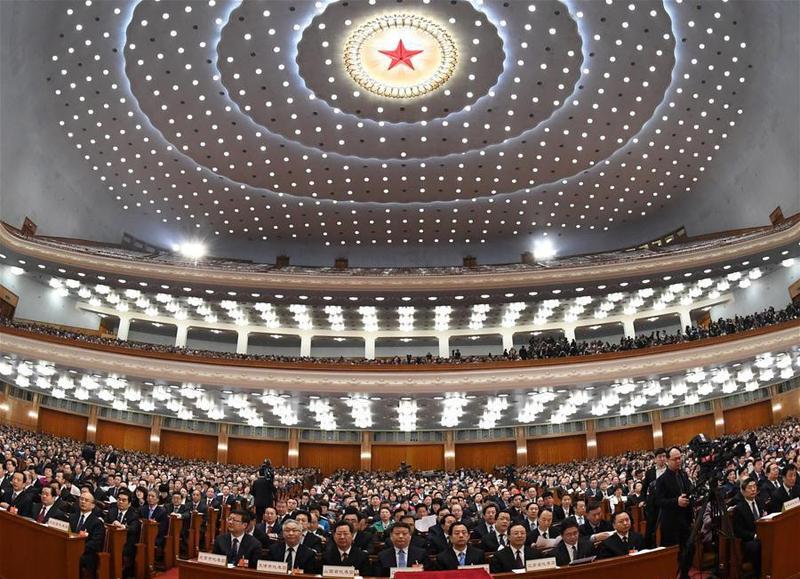Media Report

- The Washington Post reports: "China announced Tuesday it will bolster the power of its environmental ministry and establish a new agency to coordinate its foreign aid program in one of the biggest shake-ups of the government structure in decades. The changes cut the number of ministries in China's cabinet, the State Council, by eight down to 26 to streamline government and reduce bureaucratic infighting. But it will also strengthen the Communist Party's top-down control, one of President Xi Jinping's overriding goals, officials said. The overhaul also included a decision to merge the banking and insurance regulatory agencies to improve supervision of the country's debt-laden financial sector."
- Politico reports: "President Donald Trump is getting ready to crack down on China. Trump told Cabinet secretaries and top advisers during a meeting at the White House last week that he wanted to soon hit China with steep tariffs and investment restrictions in response to allegations of intellectual property theft, according to three people familiar with the internal discussions. During the meeting... U.S. Trade Representative Robert Lighthizer presented Trump with a package of tariffs that would target the equivalent of $30 billion a year in Chinese imports. In response, Trump urged Lighthizer to aim for an even bigger number – and he instructed administration officials to be ready for a formal announcement in the coming weeks."
- In an op-ed in the The New York Times, U.S. Senator Marco Rubio writes: "After World War II, the United States helped build an international economic order on the assumption that free and fair trade benefits all partners. During the postwar years, the American economy was unmatched by any other country. The postwar boom was fueled not just by thriving domestic demand but also by trade, which opened a flow of wealth from the world's consumers to American workers. Trade made America and our partners more prosperous and secure. This basic case for trade still stands. When we exchange goods with other nations on equal terms, both countries benefit. Maintaining the conditions that make this possible is the purpose of the international economic order that we took great care to nurture. We need to take violations of this economic order seriously. We must enforce the rules. China, in pursuit of its goals of economic and regional dominance, has been among the most egregious rule breakers."
Calendar
- 2018-03-12 South Korea moves to ease Chinese jitters over US-North Korea talks
- 2018-03-11 US protectionism could set off a digital trade war
- 2018-03-09 Trump's next trade target: China's IP theft
- 2018-03-08 U.S. Asks China for Plan to Reduce Trade Deficit by $100 Billion
- 2018-03-07 The U.S. Wants to Take On China With Trade. The Rest of the World Will Be Caught in the Middle.
- 2018-03-06 A stronger China is giving the world ‘more and more security’, Communist Party newspaper says
- 2018-03-05 Chinese Premier’s Economy Speech Offers Plenty for Critics to Dislike
- 2018-03-04 China looks to avoid US trade war as Trump steps up rhetoric
- 2018-03-02 China criticizes US trade report but silent on tariff hikes
- 2018-03-01 Beijing makes it easier for Taiwanese to work and study in China, and Taipei is freaking out over it
News
- The Washington Post China promotes foreign aid, bolsters environment ministry in government shake-up
- Politico Trump demands aides pump up anti-China tariffs
- CNBC Beijing watches and waits while Trump talks up his meeting with Kim Jong Un
- U.S. News & World Report China Says Eastern Europe Summits Have Been Very Successful
- The New York Times China's Communist Party Centralizes Power Over Finance and Pollution Control
- The Wall Street Journal In U.S.-China Tech Rivalry, Whose Side Is Qualcomm On?
- Reuters China to merge regulators, create new ministries in biggest overhaul in years
- BBC China's National People's Congress: Eye rolls and tame questions
- Financial Times China's buyers defy the law to satisfy thirst for foreign homes
- The New York Times China Unveils Superagencies to Fight Pollution and Other Threats to Party Rule
- The Verge Chinese police are expanding facial recognition sunglasses program
- The New York Times Trump Condemns Chinese Factories. China Is Already Closing Some.
- Business Insider China's government may be moving away from its two-child policy as birth rates continue to plummet
Commentary
- The New York Times To Fight China on Trade, We Need More Than Tariffs
- USA Today Mike Pompeo has an opportunity to shake up Russia, China policy, reform State Department
- The Tucson Catherine Rampell: Trump has been playing right into China's hands
- Business Times Trump-Kim meeting: What role should China play?
- Los Angeles Times Who in the world will defend democracy?
- The New York Times A Reporter Rolled Her Eyes, and China's Internet Broke
- Forbes How An Australia-Canada-Japan Led TPP-11 Trade Deal Compares To China's Alternative
